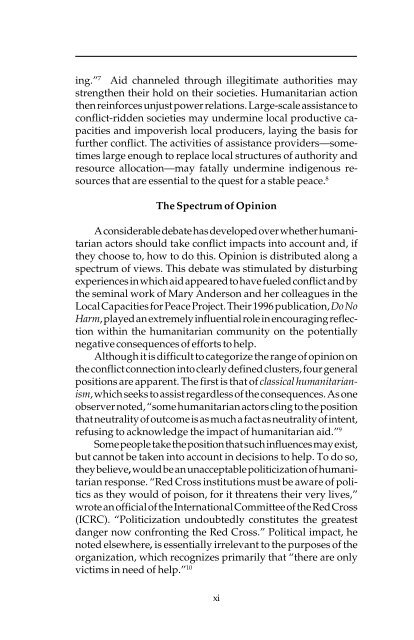Brown Cover OP 43 - The Watson Institute for International Studies
Brown Cover OP 43 - The Watson Institute for International Studies
Brown Cover OP 43 - The Watson Institute for International Studies
You also want an ePaper? Increase the reach of your titles
YUMPU automatically turns print PDFs into web optimized ePapers that Google loves.
ing.” 7 Aid channeled through illegitimate authorities may<br />
strengthen their hold on their societies. Humanitarian action<br />
then rein<strong>for</strong>ces unjust power relations. Large-scale assistance to<br />
conflict-ridden societies may undermine local productive capacities<br />
and impoverish local producers, laying the basis <strong>for</strong><br />
further conflict. <strong>The</strong> activities of assistance providers—sometimes<br />
large enough to replace local structures of authority and<br />
resource allocation—may fatally undermine indigenous resources<br />
that are essential to the quest <strong>for</strong> a stable peace. 8<br />
<strong>The</strong> Spectrum of Opinion<br />
A considerable debate has developed over whether humanitarian<br />
actors should take conflict impacts into account and, if<br />
they choose to, how to do this. Opinion is distributed along a<br />
spectrum of views. This debate was stimulated by disturbing<br />
experiences in which aid appeared to have fueled conflict and by<br />
the seminal work of Mary Anderson and her colleagues in the<br />
Local Capacities <strong>for</strong> Peace Project. <strong>The</strong>ir 1996 publication, Do No<br />
Harm, played an extremely influential role in encouraging reflection<br />
within the humanitarian community on the potentially<br />
negative consequences of ef<strong>for</strong>ts to help.<br />
Although it is difficult to categorize the range of opinion on<br />
the conflict connection into clearly defined clusters, four general<br />
positions are apparent. <strong>The</strong> first is that of classical humanitarianism,<br />
which seeks to assist regardless of the consequences. As one<br />
observer noted, “some humanitarian actors cling to the position<br />
that neutrality of outcome is as much a fact as neutrality of intent,<br />
refusing to acknowledge the impact of humanitarian aid.” 9<br />
Some people take the position that such influences may exist,<br />
but cannot be taken into account in decisions to help. To do so,<br />
they believe, would be an unacceptable politicization of humanitarian<br />
response. “Red Cross institutions must be aware of politics<br />
as they would of poison, <strong>for</strong> it threatens their very lives,”<br />
wrote an official of the <strong>International</strong> Committee of the Red Cross<br />
(ICRC). “Politicization undoubtedly constitutes the greatest<br />
danger now confronting the Red Cross.” Political impact, he<br />
noted elsewhere, is essentially irrelevant to the purposes of the<br />
organization, which recognizes primarily that “there are only<br />
victims in need of help.” 10<br />
xi

















